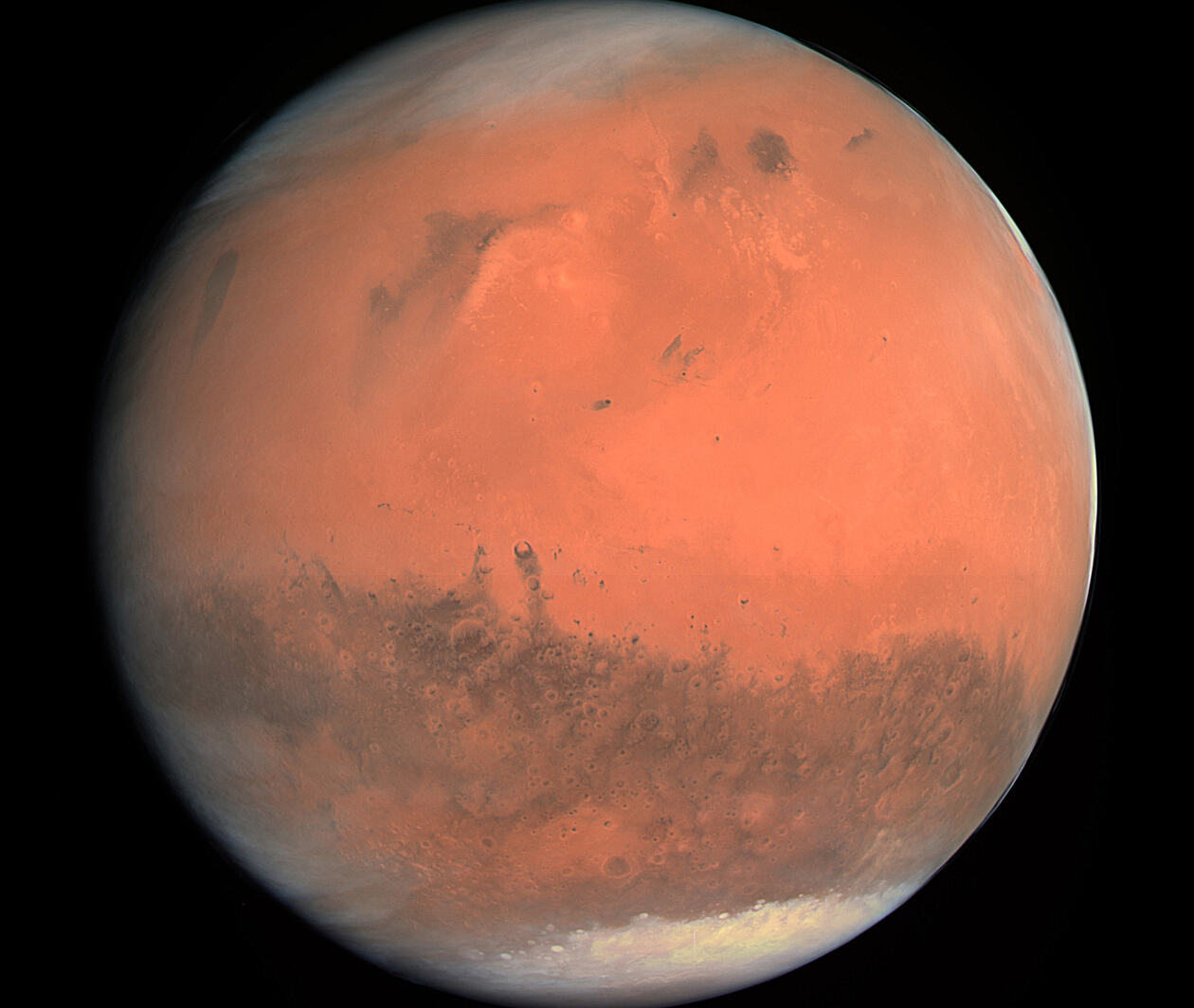This course is part of the Life on Mars, Earth and Beyond with Dr Louisa Preston ExpertTrack
Life on Mars
Discover our neighbouring planet, Mars, and delve into the missions and mysteries surrounding life on the planet.

Duration
3 weeksWeekly study
3 hours100% online
How it worksIncluded in an ExpertTrack
Course 3 of 5
Life on Mars
Take a front-row ride to the red planet
What’s it made of? Is there water there? Can we live there? These are the biggest questions experts are asking about Mars, and they’re getting ever closer to finding the answers.
On this three-week course, Dr Louisa Preston will take you on a tour of Mars, guiding you through the theories, evidence, and future plans surrounding the red planet.
Find out what it’s really like on Mars
With Mars being relatively close to Earth, in space terms at least, we’ve already managed to launch missions to the planet and build a picture of its history and makeup.
You’ll start by looking at the red planet against Earth, comparing the structure, environment, and weather of Mars with our home planet’s. You’ll then delve into the history of our neighbouring planet and discover the changes it has gone through, including the process of impact cratering.
Is there life on Mars?
While there isn’t any evidence of current life on Mars, some has been found that implies life could once have existed on the planet.
This course will guide you through the evidence for past water on Mars and how this could suggest, along with other findings, there was once life on the red planet. You’ll also take a broader look at the elements needed for life to thrive before examining the physical limits to life existing on Mars such as radiation, pH, and, of course, water.
Discover the many missions to Mars and what they found
So far, there have been roughly 50 missions sent to Mars, with around half of them being successful. Each mission has had its own purpose and used different tools and technologies to gather data.
Throughout this course, you’ll look at the search for life on Mars, delving into the missions sent to Mars to detect life and the evidence these missions have found that could imply past life on the planet.
Syllabus
Week 1
Mars inside and out
Welcome to the course
Mars might be the key to answering one of the most profound questions ever posed: Are we alone? And for us to start to answer this, we must first understand the geology and history of the planet.
Getting to know the Red Planet
The fourth planet from the Sun is built a lot like the Earth. Here we will discover how similar our two worlds actually are and what that means for Mars’ potential to have hosted life.
The geological record on Mars
Here we will explore the geological history of Mars and discuss the importance of studying the rocks of Mars to help us further understand the Earth.
Dating Mars
How can you figure out the age of rocks on another planet without actually doing fieldwork in person on that planet? Here we will discover how we are using Martian meteorites and impact craters to date the Red Planet.
Weekly wrap-up
Despite its similarities to Earth, Mars is a unique world that has undergone a lot of environmental change over time. Here we will recap key concepts and think about how we can apply them to our search for water on Mars next week.
Week 2
Water
Welcome to Week 2
This week we'll start to explore the availability of a key ingredient for life on Mars, water. Evidence suggests it flowed across the surface billions of years ago but has since disappeared. What happened to it? Where did it go?
Water on Mars
Here we will focus on the properties of water and how this affects its stability on Mars. We will also explore the evidence for past liquid water activity on the surface and what this means for its ancient habitability.
Missions to Mars
Here you will be introduced to the early explorations of Mars and complete a Peer Graded Assignment based on the missions sent in the search for water.
Mars today
Mars today is a red and dusty world, a frozen dry vestige of the planet it used to be. Here we'll explore what happened to Mars’ surface liquid water, if there is still liquid water possible today, and what we're doing to find it.
Weekly wrap-up
This week, you’ve learnt about the history of water on Mars, from a warmish wet world to a dry frozen one. Here we'll bring everything you’ve learnt about water together, ready for its application to the search for life next week.
Week 3
Searching for life
Welcome to Week 3
“Life on Mars?” is not just the name of one of David Bowie’s best songs. It is also the ultimate scientific question, one which I and many others are working to answer. This week we will explore how our work is progressing.
Mars habitability
A toxic atmosphere, minimal oxygen and an average temperature of -63°C makes the surface of Mars seem rather inhospitable to life, especially humans. Yet here we'll explore whether there are in fact habitable environments on Mars.
Hunting for life on Mars
Here we will bring earlier concepts together to look at the search for life on Mars, what we are looking for, and how the environment of Mars is throwing a spanner in the works.
Follow the carbon
Previously, exploring Mars has been led by the premise ‘follow the water’. Now we've found water, we're ‘following the carbon’ in a bid to identify habitable environments on the planet, and maybe even find evidence of life itself.
Course wrap-up
This week we have covered the search for evidence of life on Mars, both today and in the past. Now it is time to wrap-up and consolidate everything you have learned in this course.
Prove you're job ready
Highlight the new, job-relevant skills you’ve gained and supplement existing qualifications with a hard-earned, industry-specific digital certificate – plus one for every course within your ExpertTrack.
- Learn the latest in your chosen industry or subject.
- Complete each course and pass assessments.
- Receive certificates validated by the educating organisation.
- Impress employers with learning outcomes you can add to your CV.
- Make your career dreams a reality.
Download a PDF
Learning on this course
On every step of the course you can meet other learners, share your ideas and join in with active discussions in the comments.
What will you achieve?
By the end of the course, you‘ll be able to...
- Compare the structure, environment and weather of Mars with Earth
- Explain the significance of the geological history and environmental changes of Mars
- Describe the process of impact cratering on Mars
- Evaluate the evidence for past water on Mars
- Evaluate the evidence the missions found and the implications for past life
- Identify the different ways we can characterise water on other planets
- Describe the elements needed for life
- Discuss the physical limits to life existing on Mars
- Describe the missions sent to Mars to detect life
Who is the course for?
This course is designed for anyone interested in the fundamentals of astrobiology, particularly Mars and the search for life on the red planet.
It will be especially useful to university applicants looking to identify areas that they’d like to specialise in and STEM teachers looking to bring science to life for their students.
Who will you learn with?
I am an astrobiologist, geologist, and author at the Natural History Museum in London. I am also on the science team for the European Space Agency ExoMars 2022 Mars rover ‘Rosalind Franklin'.
Start learning today - free 7-day trial
After your free trial you can:
- Pay $39 per month to keep learning online
- Have complete control over your subscription; you can cancel any time
- Work at your own pace and set your own deadlines at every stage
- Only pay while you’re learning; the subscription will cancel automatically when you finish
- Complete online assessments to test your knowledge and prove your skills
- Earn digital course certificates and a final award that you can share online, with potential employers, and your professional network
- Keep access to the content of courses you complete even after your subscription ends
Learning on FutureLearn
Your learning, your rules
- Courses are split into weeks, activities, and steps to help you keep track of your learning
- Learn through a mix of bite-sized videos, long- and short-form articles, audio, and practical activities
- Stay motivated by using the Progress page to keep track of your step completion and assessment scores
Join a global classroom
- Experience the power of social learning, and get inspired by an international network of learners
- Share ideas with your peers and course educators on every step of the course
- Join the conversation by reading, @ing, liking, bookmarking, and replying to comments from others
Map your progress
- As you work through the course, use notifications and the Progress page to guide your learning
- Whenever you’re ready, mark each step as complete, you’re in control
- Complete 90% of course steps and all of the assessments to earn your certificate
Want to know more about learning on FutureLearn? Using FutureLearn
Learner reviews
Learner reviews cannot be loaded due to your cookie settings. Please and refresh the page to view this content.

